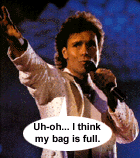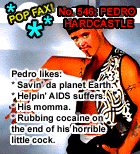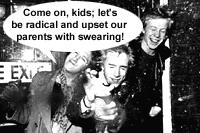Because
society forever teeters on the brink of social, moral
and political collapse, we, as the citizens of this
society, cannot be trusted to think for ourselves.
Because of this we have always looked to the authorities
to protect us from dangerous ideas, concepts and ideals,
and for many years the BBC was as the frontline, leading
the crusade by fighting evil with a big stick, and a
sock full of gravel. Though BBC Radio no longer
officially “bans” a single when it has the potential
to outrage public decency, it will instead quietly keep
it off of the playlists.
 Recent
examples of such soft-banning have included The
Prodigy’s Smack My Bitch Up, in which the band
implored you to smack their bitch up, and Cliff
Richard’s Millennium Prayer, in which he effectively
implored listeners to smack him up, the bitch.
Astonishingly, the risible God-cash-in wasn’t the
first Cliff record to be banned. His 1972 single Honky
Tonk Angel was removed from playlists at the behest of
Cliff himself, after he discovered that the title and
lyrics referred to prostitution. Clearly, when agreeing
to record the song Cliff hadn’t realised that this was
the sort of angel who charged money to let you through
her pearly gates and play her harp… Status Quo were so
outraged when their appalling cover version of the Beach
Boys’ Fun Fun Fun failed to make playlists in 1995
that they unsuccessfully attempted to sue the BBC for
being “ageist”. Surprisingly, the high-profile court
battle isn’t mentioned on the otherwise comprehensive
band history to be found on the official Quo website.
Recent
examples of such soft-banning have included The
Prodigy’s Smack My Bitch Up, in which the band
implored you to smack their bitch up, and Cliff
Richard’s Millennium Prayer, in which he effectively
implored listeners to smack him up, the bitch.
Astonishingly, the risible God-cash-in wasn’t the
first Cliff record to be banned. His 1972 single Honky
Tonk Angel was removed from playlists at the behest of
Cliff himself, after he discovered that the title and
lyrics referred to prostitution. Clearly, when agreeing
to record the song Cliff hadn’t realised that this was
the sort of angel who charged money to let you through
her pearly gates and play her harp… Status Quo were so
outraged when their appalling cover version of the Beach
Boys’ Fun Fun Fun failed to make playlists in 1995
that they unsuccessfully attempted to sue the BBC for
being “ageist”. Surprisingly, the high-profile court
battle isn’t mentioned on the otherwise comprehensive
band history to be found on the official Quo website.
Possibly
most famous example of Radio One-bannage was Jane Birkin
and Serge Gainsbourg’s J’Taime, in 1969. Aside from
the song’s suggestive heavy breathing, Gainsbourg
urging the listener to go “entre tes reins” (between
your kidneys) was considered by the moral watchdogs to
be a reference to anal sex. And they were probably
right. Likewise, Pete Shelley’s Homosapien was
excluded from the playlist in the early 80s for the line
“Homo Superior in my interior”, and Scott Walker’s
Jackie outraged BBC bosses, who were clearly personally
offended by references to “Authentic queers”.
 Famously,
in 1983 Radio One DJ Mike “Myfanwy” Read sussed the
worst-kept non-secret in music. Having just played
Frankie Goes To Hollywood’s Relax, the red-faced and
fuming twat apologised to listeners for not realising
that the lyrics “Relax, just do it, when you want to
suck to it, Relax, just do it, when you want to come,”
were a reference to ejaculation and possible homosexual
activities, such as bum-ups, men-touch and
knob-knob-suck-suck (the outraged Read being a fine one
to talk, given that, according to a national newspaper
some years later, he liked to bed impressionable young
fans while listening to The Icicle Works). By the time
the BBC got around to banning Relax it had already been
performed on Top Of The Pops, and was at number two in
the charts. The resultant publicity surrounding the ban
propelled it to number one.
Famously,
in 1983 Radio One DJ Mike “Myfanwy” Read sussed the
worst-kept non-secret in music. Having just played
Frankie Goes To Hollywood’s Relax, the red-faced and
fuming twat apologised to listeners for not realising
that the lyrics “Relax, just do it, when you want to
suck to it, Relax, just do it, when you want to come,”
were a reference to ejaculation and possible homosexual
activities, such as bum-ups, men-touch and
knob-knob-suck-suck (the outraged Read being a fine one
to talk, given that, according to a national newspaper
some years later, he liked to bed impressionable young
fans while listening to The Icicle Works). By the time
the BBC got around to banning Relax it had already been
performed on Top Of The Pops, and was at number two in
the charts. The resultant publicity surrounding the ban
propelled it to number one.
Others
were less fortunate. Years earlier The Au Pairs’ Come
Again disappeared without a trace following a ban, as
did Ivor Biggun’s The Winker’s Song (Misprint), in
1978. However, Biggun later achieved notoriety on Esther
Rantzen’s That’s Life as Doctor Cox, replacing
cross-eyed eldster Cyril Fletcher in the show’s
regular “rude vegetable” slot. It wasn’t carrots
shaped like penises which led to the banning of The
Trogg’s I Can’t Control Myself, in 1966, but a
combination of the suggestive title, and a dirty noise
made by Reg Presley. Likewise The Rolling Stones’
Let’s Spend The Night Together, which was alleged –
not without good reason – to promote the evil of
promiscuity. More shockingly still, The Beatles’ I Am
The Walrus was considered too risqué to broadcast, due
to its use of the line “Boy, you been a naughty girl,
you let your knickers down”.
Of
course, profanity is an immediate no-no when it comes to
choosing BBC playlists, and so The Super Furry
Animals’ The Man Don’t Give A Fuck, The Dead
Kennedys’ Too Drunk To Fuck, Fatboy Slim’s Fucking
In Heaven, Neil Young’s Fucking Up, Ian Dury’s
Fucking Ada, and Oasis’s forthcoming Fuckin’ In The
Bushes have never been candidates for airplay. Stupidly,
Richie Kavanagh’s folky Aon Focal Eile was banned
because the first syllable of “focal” – Celtic for
“word” – was considered to sound too much like
“fuck”. Others made it through with edits.
Prince’s Sexy Motherfucker was renamed Sexy MF and
bleeped, as was Radiohead’s Creep (the line
“You’re so fucking special” getting the censorship
treatment), while Beautiful South’s Don’t Marry Her
Have Me was originally titled Don’t Marry Her Fuck Me.
 Sex
and swearing aren’t the only reasons for the BBC to
ban records; the allegedly neutral Kommandant Beeb
can’t be seen to promote any sort of political
opinion, and so records containing apparently pro-IRA
sentiments such as Paul McCartney’s self-explanatory
Give Ireland Back To The Irish, Marxman’s Sad Affair,
McGuinness Flint’s Let The People Go and The
Police’s Invisible Sun, were all kept from broadcast.
The Sex Pistols’ anti-royalist God Save The Queen was
likewise kept from the ears of BBC Radio listeners for
being rude about Her Maj’ The Vag’ (our term, not
theirs). Former Marillion frontman Fish got off to a bad
start with his solo career (and it all went downhill
from there) by opening his 1989 debut solo single, State
Of Mind, with the line “I don’t trust the
government” (Marillion’s first single, Market Square
Heroes survived a ban in 1983 by changing a reference to
“Anti-Christ” to “battle priest”… no, really).
Sex
and swearing aren’t the only reasons for the BBC to
ban records; the allegedly neutral Kommandant Beeb
can’t be seen to promote any sort of political
opinion, and so records containing apparently pro-IRA
sentiments such as Paul McCartney’s self-explanatory
Give Ireland Back To The Irish, Marxman’s Sad Affair,
McGuinness Flint’s Let The People Go and The
Police’s Invisible Sun, were all kept from broadcast.
The Sex Pistols’ anti-royalist God Save The Queen was
likewise kept from the ears of BBC Radio listeners for
being rude about Her Maj’ The Vag’ (our term, not
theirs). Former Marillion frontman Fish got off to a bad
start with his solo career (and it all went downhill
from there) by opening his 1989 debut solo single, State
Of Mind, with the line “I don’t trust the
government” (Marillion’s first single, Market Square
Heroes survived a ban in 1983 by changing a reference to
“Anti-Christ” to “battle priest”… no, really).
 As
everyone who lived through it remembers, the Gulf War
was great. However, BBC schedulers had to be
particularly sensitive to ensure no listening Iraqis
were offended by the playlist. Among the songs banned
for the duration of the war were anything by Bomb The
Bass and Massive Attack, The Cure’s Killing An Arab,
The Doors’ Light My Fire, Carter The Unstoppable Sex
Machine’s Bloodsport For All, Status Quo’s In The
Army, Lulu’s Boom Bang A Bang, and any song with
“War” in the title. The KLF’s 3am Eternal was
deemed inappropriate, as it opened with the sound of
machinegun fire. Less
justifiable were Gulf War bans on A-Ha’s Hunting High
And Low, and, most astonishingly of all, Eurovision
award winner Nicole’s A Little Peace.
As
everyone who lived through it remembers, the Gulf War
was great. However, BBC schedulers had to be
particularly sensitive to ensure no listening Iraqis
were offended by the playlist. Among the songs banned
for the duration of the war were anything by Bomb The
Bass and Massive Attack, The Cure’s Killing An Arab,
The Doors’ Light My Fire, Carter The Unstoppable Sex
Machine’s Bloodsport For All, Status Quo’s In The
Army, Lulu’s Boom Bang A Bang, and any song with
“War” in the title. The KLF’s 3am Eternal was
deemed inappropriate, as it opened with the sound of
machinegun fire. Less
justifiable were Gulf War bans on A-Ha’s Hunting High
And Low, and, most astonishingly of all, Eurovision
award winner Nicole’s A Little Peace.
So
you see, were it not for the moral guardians of taste
and decency at the BBC, our world would be awash with
filth and depravity of the unholiest kind.
They
may not always get it right (they failed to ban George
Michael’s I Want Your Sex, instead committing to
post-watershed airplay only), but they kept Cliff’s
Christian rallying cry off number one at Christmas. And
for that, we should all be thankful.
